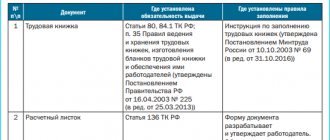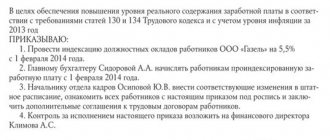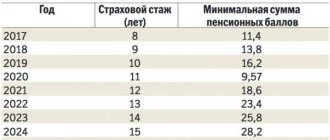The laws of the Russian Federation ensure that the male population is sent to retirement at the age of 60, and the female population at 55. Today, the majority of citizens work even after receiving their earned rest. True, a new draft law on pensions is already being considered.
Working pensioners, according to the Labor Code of the Russian Federation, can send a request for resignation without prior warning to the employer. This article will discuss in more detail the issues of deductions for older workers without working hours.
Do pensioners work off when they are fired?
If an older person resigns, re-employment often depends on the whim of management.
The release of an elderly citizen of his own free will without modification is permitted in accordance with Art. 80 Labor Code of the Russian Federation. Also, they are not forced to work for 2 weeks if an elderly person resigns due to deteriorating health.
An elderly citizen who gets a job at an enterprise while already retired, when leaving the enterprise, must notify his superiors 2 weeks in advance, like any employee.
As an exception, it is possible to deduct without working out under the “Agreement of the Parties”, if this is provided for in the employment contract upon admission to the company.
Is it possible to quit without passing the two-week deadline?
Labor legislation provides for only two cases in which an employee has the right to be released from performing his job duties immediately after submitting a written application to terminate the contract:
- Due to retirement.
- Upon admission of a citizen to an educational institution.
Dismissal of a pensioner without working out a two-week period occurs only once in the employee’s life - when leaving work after reaching the appropriate age, about which a corresponding entry is made in the work book.
Read more about working off when retirees retire at their own request here.
For those who do not know whether it is possible to quit their job for another reason and not work for 14 days as a pensioner, this issue should be resolved with the employer. The Labor Code does not provide for any other grounds for releasing an employee from duties on the day the application is submitted, however, a private agreement with management often leads to a successful resolution of this issue.
Explanations from Rostrud
Due to the large number of labor disputes regarding the application of the rule of law on the dismissal of a pensioner without service, it is recommended to use the official explanations given in the comments of Rostrud.
What employers should pay attention to when terminating an employment contract with older employees:
- All pensioners, regardless (military, benefits, early retirement, etc.), are exempt from the mandatory two-week work period;
- An employee is allowed to use this right only once;
- After making an entry in the work book about dismissal “due to retirement,” it is prohibited to use this wording again;
- It is prohibited to force older specialists to leave work;
- If an employee does not agree with these requirements or the interpretation of Rostrud’s explanations about whether a pensioner can be fired, the dispute must be resolved in court.
In the event of a gross violation of the norms of the Labor Code of the Russian Federation, the employer risks being held accountable if the employee files an official complaint with the Labor Inspectorate and provides the necessary confirmation.
Calculation
Upon leaving work, the pensioner has the same rights to purchase payroll as other employees.
Therefore, he has the right to receive:
- Salaries for actual work.
- Output accrual.
- Holiday pay payments.
- Other payments accepted in the employment agreement (if it is terminated).
An elderly citizen is awarded a 2-week benefit if:
- His inadequacy for the position he holds.
- Failure to comply with work obligations due to deteriorating health.
- If his post was taken by an employee who worked previously.
- If an elderly person does not want to transfer.
Benefit in the amount of 2 months salary:
- Upon liquidation of an institution.
- When staffing is reduced.
- If the contract is terminated due to the fault of management.
Payments and compensations
If a pensioner resigns of his own free will, by agreement of the parties, or upon retirement, the employer must pay him:
- wages for the time actually worked in the month in which the employment relationship is terminated;
- compensation for unused vacation, if any in the current working year;
- additional benefits at the discretion of the employer.
If a pensioner resigns due to staff reduction or liquidation of an enterprise, then the employer pays him:
- wages for actual time worked;
- compensation for unused vacation, if any;
- benefits for the first two months after dismissal, for the third - if necessary;
- Additional benefits are paid at the discretion of the employer. The law does not provide for this.
- if the pensioner carried out his labor functions in the regions of the Far North or in areas with a similar status, then the benefit is paid for a period of up to six months.
There are times when the benefit amount may be reduced:
- work of a pensioner in seasonal work;
- refusal to transfer him to permanent work at another enterprise, by agreement between employers.
Work upon dismissal of a pensioner at his own request
Some managers find it difficult to correctly carry out the process of dismissing older employees according to their personal will, although there is nothing difficult here, except for the timing of release from work.
Let's consider different options for releasing a working pensioner from work of his own free will:
Option 1. C has retired and continues to work. After a certain period, he wrote a request for deduction in connection with his retirement. In this option, the procedure for his resignation is formalized according to general standards, as with deduction at the personal will of any specialist, with one exception: the pensioner is released from obligations without working off (Article 80 of the Labor Code of the Russian Federation), i.e. the boss is obliged to expel the person on the date shown in the pensioner’s petition.
Option 2. The employee has applied for a pension. After some time, I went to work for the company and then turned to the company’s management with the intention of leaving. Here he must submit a petition 14 days before his expulsion (Article 80 of the Labor Code of the Russian Federation).
If an elderly worker states in his petition: “I ask to be released from work as a working pensioner,” then the working time is three days.
Of course, with an agreement with the authorities, an elderly citizen can leave without further work.
Dismissal of a pensioner with modification. Forcing an elderly specialist to complete a two-week period of work if he indicated in the application the reason - “... in connection with retirement ...”, is quite risky, since if he suddenly files a complaint about illegal actions of his superiors to the labor inspectorate, then the latter may be subject to an administrative penalty. fine (part 1 of article 5.27 of the Code of Administrative Offenses of the Russian Federation):
- from 30 thousand to 50 thousand rubles. - for the enterprise.
- from 1 thousand to 5 thousand rubles. – for responsible persons of the company/individual entrepreneur.
Does it need to be improved?
A person is not required to complete two weeks of work when retiring. The number that he will display in the application will be the day he leaves the company.
Dismissal procedure
Quite often, due to age, health or family reasons, a person decides to quit his job of his own free will.
For a working pensioner, this procedure is no different from the dismissal of an ordinary employee of an enterprise.
The basis for settlement from the workplace is the employee’s statement of resignation at his own request.
You should not indicate “retirement or reaching retirement age” as a reason. This formulation is incorrect, because the employee is already retired and cannot re-enter it.
The application must include a management visa. In addition, at his own discretion, a working pensioner may or may not work for two weeks. An indication that the employee is a pensioner is required in the application submitted for signature to management.
The work book handed out may or may not indicate the reason for dismissal in the following wording: “Dismissed from his position at his own request due to retirement age or retirement.”
The specific procedure depends on the grounds for termination of the employment contract, which the employer will subsequently refer to in the order.
When dismissing due to staff reduction, reference to the employee’s age will be unlawful, and the dismissal will be illegal.
The procedure must be properly formalized by order of the organization, on the basis of which payments guaranteed by law are calculated, and the employee must be notified in a timely manner.
Termination of a working relationship for medical reasons (recognition as completely incapacitated for work) is possible only if a prohibition on continuing activities is indicated in the medical report. If there are recommendations for transfer to another position, the employer is obliged to provide the corresponding vacancies (if any). Only if the pensioner refuses the job offer can the employer legally dismiss him.
The subordinate must sign for the receipt of the work book and documents.
Dismissal of a pensioner at his own request without service
In Art. 80 of the Labor Code of the Russian Federation it is noted that a working citizen resigns without completing the fourteen-day period due to a situation that does not allow him to continue working. Among the reasons mentioned is the sending of a citizen to a pension situation. Reaching old age cannot be a reason for forced retirement. The expulsion of an elderly person at his own request is a right, not an obligation.
The Labor Code of the Russian Federation does not determine the time between the right to register a pension provision and the deduction of an elderly person at his own request. Such a person can resign either immediately upon reaching old age or after some time worked.
Management does not have the right to set a pensioner’s rework period. When registering a resignation letter from a pensioner, management is obliged to release the pensioner on the date written by him (clause 3 of Article 80 of the Labor Code of the Russian Federation). This article requires that a person, when applying for dismissal, state the reason for resignation.
An example of the text of the petition may look like this: “I ask you to release me from work on August 25, 2020, in connection with my retirement.” A number of managers require that the request be supported by a copy of the pension document. This is an illegal demand.
The legislative framework
The main legislative act that should be relied upon when resolving issues related to the procedure and procedure for dismissal is the Labor Code of the Russian Federation (RF).
It contains a complete list of the grounds and reasons why it occurs. Yes, Art. 80 regulates the dismissal procedure. This is where the need to warn the employer about this is indicated.
The deadline is 2 weeks. At the same time, this article states that if the dismissal of an employee is directly related to the fact that he cannot continue his work function (including for the reason discussed in the article), then the employer is obliged to relieve him from performing relevant duties on the date , which the employee himself will indicate.
Explanation of the situation from Rostrud
The Labor Code norm discussed above is general and cannot take into account specific situations.
However, there are corresponding clarifications from Rostrud, a government agency whose task is to monitor compliance with labor laws in terms of protecting the interests of both employees and employers.
So, the following citizens have the right to leave their place of work without mandatory two-week work:
- Pensioners of all categories. The nature and type of pension provision does not matter.
- Employees leaving their jobs due to the relevant agreement.
Important! The agreement to terminate the employment relationship must be properly drawn up, otherwise, if controversial situations arise, it will be difficult for the employee to prove his case.
Step-by-step instruction
As stated earlier, a pensioner has the right to leave the company due to retirement without notifying 2 weeks in advance.
The petition only needs to indicate the date of deduction and the basis. An elderly person must understand that management does not have the right to expel him due to the onset of old age (Article 3 of the Labor Code of the Russian Federation). At the same time, an elderly person has the same rights as other employees, without benefits. However, if he periodically violates labor discipline or does not fulfill the obligations assigned to him, the manager has the right to expel him on the grounds noted in Art. 81 Labor Code of the Russian Federation.
If an employee has reached old age, he cannot be dismissed on this basis, however, his superiors can transfer him to another vacancy, and then only with his written consent. Options for deduction of a working pensioner:
- By his will
- By decision of management (staff reduction, violation of Labor Code)
- By agreement of the parties.
- Resignation of a pensioner according to his personal will
A working elderly citizen has the right to send a request for dismissal from the company, and management is obliged to grant his request. If the reason for resignation is indicated in the petition “... in connection with retirement ...”, the person is not obliged to work the allotted time, however, he will be able to use this right only once.
The manager, when dismissing such a person, must complete the entire process of issuing him a full payment (salary, compensation for lost vacation and, in a number of situations, severance accrual). The entry “... in connection with retirement” is entered in the work book.
If an elderly person, after retirement, went to work for some enterprise, he will no longer be able to resign without working out. He will have to warn his superiors about his intention to leave the company, in general order - 14 days in advance.
- Dismissal of a pensioner due to staff reduction
During a period of staff reduction, an elderly person has the advantage of remaining at the company. However, many companies are laying off pensioners.
The order of reduction is as follows:
- The manager must notify the specialist 2 months in advance against signature.
- An order is posted for the institution, which sets out amendments to the staffing table, reflecting a reduction in the vacancy occupied by an older worker.
- If the contract specifies any benefits for older employees, they must be fulfilled.
- The management is obliged to provide the older employee with another vacancy that is not subject to reduction.
- If the elderly person does not agree to transfer to the provided vacancy, the manager has the right to terminate the labor relationship.
In case of staff reduction, an elderly person will be given all the accruals:
- salary for actual work.
- Compensation for lost vacation.
- 2-month benefit after calculation, and if necessary, for the third month.
- Additional benefits are issued at the discretion of the manager. This is not provided for by the regulations.
- Dismissal by agreement of the parties.
This method of dismissal can be used if this is noted in the contract and for other circumstances noted in the Labor Code of the Russian Federation.
Among other things, you can simply reach an agreement with management due to circumstances that have arisen that require an urgent resolution of the issue.
For health reasons: legal framework
First of all, let’s determine which employees can be recognized as pensioners and whether it is possible to dismiss a working pensioner at the initiative of the employer in a special manner.
So, the employee became a pensioner and applied for a pension, but still continues to work in his position. In this situation, does the employer have special grounds for dismissing a pensioner{q} Note that this question is quite popular and is often asked by employers.
https://www.youtube.com/watch{q}v=M9SRSP3lvcs
Let us say right away that the organization does not have the right to dismiss a pensioner on its own initiative if the grounds for dismissal are not provided for in the Labor Code of the Russian Federation. In other words, a pensioner has all the rights of an employee of the organization and any infringement of these rights is illegal.
Moreover, labor laws prohibit any discrimination based on age. Therefore, reaching a certain age and retirement is not grounds for either dismissing an employee or transferring him to another position in the absence of medical contraindications. There are exceptions to this rule, but they apply to a narrowly limited category of persons.
In this regard, after the employee reaches a certain age and receives a pension, he, if he wishes, can continue to work under the same conditions. The employee's retirement age does not provide any special rights to the employer.
And here is another very pressing question. Article 59 of the Labor Code of the Russian Federation allows concluding fixed-term employment contracts with old-age pensioners. An urgent agreement is concluded by agreement of the parties. However, this does not mean that after the employee becomes a pensioner, the open-ended employment contract is terminated and a fixed-term employment contract must be drawn up. Note that this is a fairly widespread misconception.
After receiving pensioner status, the current employee does not have any restrictions. His employment contract continues to operate on the same terms. And there are no grounds for terminating a permanent employment contract and concluding an agreement on urgent terms.
Reference
Retrenchment of a retired employee at the initiative of the employer
Most often, when carrying out a staff reduction procedure, employers intend to fire retired employees first. However, there are no legal grounds for such actions. Working pensioners have equal rights with all other workers. And their preferential right to remain at work upon dismissal should be assessed based on general characteristics.
By the way, we can say that pensioners are most often those employees who are subject to preferential rights. The point is that when determining employees who remain at work. Qualification and labor productivity are taken into account. And compared to other workers, a pensioner may have higher qualifications and longer work experience.
Accordingly, based on these indicators, it is the retired employee who can take advantage of maintaining his job during layoff.
Read more about the reduction of a pensioner at the initiative of the employer in our article.
As we already said. The age of an employee is not a basis for terminating an employment contract with him. And neither pensioners nor employees of pre-retirement age are subject to dismissal due to reduction in the first place.
Meanwhile, those employees who have been laid off and have very little time left before retirement have certain advantages. They may retire before they reach retirement age. This right is granted to them by the Law of the Russian Federation of April 19, 1991 No. 1032-1 “On Employment”.
Reference
However, in order to retire earlier than the established period, the following conditions must be simultaneously met:
- dismissal is made on the basis of a reduction in staff or number of employees;
- the employee has developed insurance experience, namely, women must have at least 20 years of experience, and men must have at least 25 years;
- The employee has no more than two years left until retirement. For example, an employee laid off due to redundancy who is 53 years old can retire early;
- the employment service was unable to find a job for the employee and issued a proposal to grant an early pension;
- the employee himself agrees to receive an early pension.
Just like all other employees, laid-off pensioners receive severance pay upon dismissal, which is equal to the average monthly earnings. This rule is established by part 1 of article 180 of the Labor Code of the Russian Federation.
Also, the dismissed pensioner must be paid the average salary for the period of searching for work. In fact, such compensation is paid for the second month after dismissal, if the employee has not found a new job.
Moreover, the fact that an employee receives a pension does not in any way affect the employer’s obligation to make these payments.
The question arises in the situation of maintaining average earnings in exceptional cases for the third month of absence from work. The thing is. that for this you need to register with the employment service and obtain the status of unemployed. But the question of whether a pensioner can be recognized as unemployed is debatable.
It should be noted that at the beginning of this year, the Supreme Court recognized that it is important to understand why a laid-off employee should retain his average salary while looking for work. Previously, he believed that for this it was enough just to register on time and not receive a suitable job offer (Review of judicial practice on northerners dated February 26, 2014).
And here it should be noted that in all the cases that reached these courts, pensioners appeared. This means that it will be most difficult for them to obtain the same average earnings. The main reason is that they receive pensions, which means they have a means of subsistence.
You can read in detail about the Supreme Court’s ruling and the conclusions reached in our material.
social vulnerability;
lack of livelihood;
presence of dependents.
It appears from the Supreme Court Review that in fact the list of exceptional circumstances is not exhaustive. Therefore, the reason for maintaining earnings may be, for example, a rare profession of an employee. In one case, an employee worked as a train compiler and assembled trains. Obviously, he could not work anywhere except in railway transport (appeal ruling of the Novosibirsk Regional Court dated May 5, 2020.
From all of the above, we can draw the following conclusion. In the event that a laid-off pensioner submits a decision from the employment service to pay him average earnings for the third month of absence from work, the organization is obliged to make the payment. If you absolutely do not agree with this obligation, then you will need to appeal the decision of the employment service in court. And not just refuse to pay an employee.
In court, the employment service will have to present those grounds that it regards as exceptional in order to preserve the employee’s average earnings for the third month of absence from work.
We suggest you read: Where to complain about clinic doctors
The employer, in accordance with the provisions of the Labor Code (Article 64), does not have the right to demand the dismissal of an employee after he has been assigned pension status.
This action is considered as discriminatory on the basis of age (including according to the Labor Code of the Russian Federation, Article 3) and is considered unfounded.
A pensioner is included in a vulnerable category of citizens, therefore he has the right to receive from the employer administrative leave in excess of that established by law, the duration of which depends on the status of the pensioner.
- 14 days - pensioners without disabilities;
- from 14 to 60 days - representatives of the group with disabilities;
- up to 35 days - WWII participants.
Going on leave without pay does not allow an employee to be removed from his position. Transferring a pensioner to a fixed-term employment contract, which simplifies the subsequent dismissal of such an employee after the expiration of the document, is also not legal.
However, if the employee’s consent is obtained, then the Labor Code (Article 59) allows for modification of labor relations.
Guarantees
If a person of retirement age wishes to resign, he is relieved of the obligation to notify the employer two weeks in advance that he intends to vacate his job. Reason: retirement due to old age (dismissal is formalized on the day the application is written).
The release of an employee from his position is carried out according to the general scheme (Article 178 of the Labor Code of the Russian Federation) and involves payment of the entire salary on the day of leaving the company. Compensation for unused vacation is made according to the following ratio: a working month is equal to 2.33 days of vacation.
Upon dismissal due to the closure of a company or a change in its staff, the payment of a monthly severance pay is added to the amounts described above, which cannot be increased to two or three months, as for persons of working age. Pensioners are not subject to registration at the employment center: due to their length of service, they are not officially recognized as unemployed.
IMPORTANT. A pensioner has the right to use the privilege of dismissal without service only once in his life.
An unfavorable health condition that does not allow one to perform job duties (chronic illnesses, injury) according to the job description allows the company owner to initiate dismissal procedures.
To give the procedure legal status, a medical commission’s conclusion will be required, containing an indication of the disease and a comment assessing the person’s ability to work.
Additional nuance: if there is a position in the company that allows the retiree to perform other duties in accordance with his ability to work, it is offered as an option for a voluntary transition.
An exception is the complete disability of a citizen (Labor Code, Article 83, paragraph 5). The presence of an employee’s refusal and the conclusion of a medical examination do not give the right to terminate the contractual relationship (Labor Code of the Russian Federation, Article 182), and a disabled person is paid a two-week allowance after leaving the company.
Labor Code of the Russian Federation, Article 182. Guarantees when transferring an employee to another lower-paid job
When transferring an employee who, in accordance with a medical report issued in the manner established by federal laws and other regulatory legal acts of the Russian Federation, needs another job, to another lower-paid job with a given employer, he retains the average earnings for his previous job for one month from the date of transfer, and in case of transfer due to a work injury, occupational disease or other work-related health damage - until permanent loss of professional ability to work is established or until the employee recovers.
Typically, pensioners are fired without working.
How to write an application?
If an older employee intends to terminate active work due to retirement, he is required to submit a request to leave the company.
There is no standard form for this application. It is compiled in a free style. A number of companies develop templates for official documents, including applications for settlement. It is advisable to write the resignation letter manually. Of course, you can compile it on your PC and then print it out. But in any case, the petition must be signed by the applicant personally.
To write a petition, you usually take an A4 sheet of paper, on which the text is written.
In order for the applicant not to have to work for 2 weeks, it is necessary to correctly record the reason for leaving.
The management of the company is obliged to accept such a form. If the manager for some reason refuses to accept the request, it can be sent by registered mail.
If an elderly person’s work record book already contains the entry “retired,” then management can dismiss him at his own peril and risk - according to general standards, with or without working out the allotted time.
Based on this, the person being dismissed must enter the corresponding number from which he wants to pay in 2 weeks or on the day of filing the application.
How to apply?
A petition for settlement filed by a working pensioner is considered a notification of his intention, as well as the basis for his superiors to issue an order.
Such a request must be completed in compliance with the rules for writing official letters.
Since the preparation of such a document is arbitrary, it is necessary to fill out the following information:
At the top right of the A4 sheet, information about the addressee (Position, company name, full name) and the person intending to leave work is entered.
After filling out the listed data, going down below, in the center we write the name of the form - “APPLICATION”, and below it the text of the appeal.
In the text of the appeal you must write a request, displaying the date of deduction and the reason. In this version “... in connection with retirement.”
At the end of the form, under the text, you must enter the date the form was filled out and sign.
Sample application for dismissal of a pensioner at his own request without service
Application example
It is not difficult to draw up a request for deduction due to retirement. For example, when submitting a request to leave the company in connection with being sent on an earned vacation, an elderly person can set the date of deduction on the day of registration of the form.
In the proposed version, the date of deduction and the date of registration of the petition may be the same. For example, “Please release me from work on August 13, 2020 due to my retirement”
The deduction date is displayed as “09/13/2019”. In this example, the authorities are obliged to release the pensioner on August 13.
When expelling according to the standards, the date of resignation must be set 14 days later than the submitted form is registered, that is, if the document is submitted on August 1, then the date of expulsion should be displayed as August 15. (Counting starts from the first day after registration of the application)
Upon resignation of other contingents entitled to a 3-day or monthly warning, naturally the date of dismissal should be displayed in accordance with the number of days for service.
How to fire him if he doesn't want to {q}
https://www.youtube.com/watch{q}v=0ZhL4wqviuY
To terminate an employment relationship with a person of retirement age, compelling reasons are required—the employer’s desire alone is not enough.
Wanting to carry out the procedure for dismissing a pensioner, HR department employees use the general grounds for terminating employment relationships, which also apply to other categories of employees.
Conditions for severing contractual relations:
- the contract has expired;
- the document contains errors in design;
- the contract was concluded with clauses that violate the laws of the Russian Federation;
- the fact of theft or damage to material assets by a pensioner has been proven.
If a person of retirement age is transferred to another organization, then the contract that is subject to termination is replaced by a newly created one, concluded in the personnel department service located at the new place of work.
Liquidation of a company or reduction of staff are conditions for the removal from the workforce of employees of retirement or pre-retirement age, whose consent is not required to make changes (Article 178 of the Labor Code of the Russian Federation). All employees, regardless of age, receive a monthly allowance.
There are other grounds for dismissal from a position.
Reasons for dismissal:
- the employee being under the influence of drugs or alcohol;
- frequent absenteeism or tardiness;
- the employee’s refusal to move with the company to another city;
- reduction of staff (including during reorganization).
Some organizations have a system for confirming the qualifications of employees, which is carried out at a certain time interval.
If a working pensioner lost his qualifications after recertification and refused to move to another position, then the removal of the employee is completely acceptable (
TK, Art. 81
, item 3).
A common reason is the recording of lateness, which can only be detected if the working hours are mentioned in the contract (its beginning, end, duration of the lunch break).
Evidence may include written testimony from a security guard or CCTV footage.
In the event of a gross disciplinary violation (example: intoxication), the boss or another employee draws up a report stating the presence of inappropriate behavior.
Additionally, signatures of other witnesses (at least two) are affixed.
Algorithm for drawing up documents:
- document execution;
- drawing up an explanatory note by the employee;
- issuance of a decree;
- familiarization of the pensioner with the document.
If the document was read aloud to the pensioner, but he refused to sign, then this behavior is recorded in the document. Signatures of those present (with date) are placed in the same way, confirming the fact of refusal.
IMPORTANT. A pensioner's membership in a trade union organization does not allow him to complete the dismissal procedure without obtaining the consent of the human rights association.
A retired pensioner receives the same benefits as an employee who does not receive a pension, including:
- compensation for days of unused vacation;
- salary for days worked in the month.
If a pensioner is subject to dismissal due to liquidation of an enterprise or reduction of staff, the following payments are added to the benefits listed above:
- during the first month of job search - severance pay;
- if after 2 months a job has not been found, compensation;
- if the pensioner is a representative of the preferential categories of workers described in Art. 318 of the Labor Code of the Russian Federation, then payments can be extended up to 6 months;
- if a pensioner is employed seasonally, he receives only two weeks’ average earnings without the payments listed above.
We invite you to read: Is it possible to challenge a deed of gift for a house in 2020?
https://www.youtube.com/watch{q}v=xcN6BXzxebM
Dismissal of a pensioner at the initiative of the employer is a rather sensitive issue both on the part of the pensioner himself and on the part of the employer. To ensure that neither party suffers, it is better to familiarize yourself with all the nuances as early as possible in order to be able to protect your rights at the right time.
But there is a completely legal way to part with a working pensioner - formalize the termination of the contract by agreement of the parties (Article 77 of the Labor Code of the Russian Federation). If a compromise can be reached, everyone will benefit: the middle-aged subordinate, and the employee will receive severance pay.
But so that the manager’s offer to terminate the agreement does not look like pressure, you need to follow some rules. First, compose the proposal itself in the most friendly manner possible. It must be stated in it that in case of refusal, the pensioner will retain his position and will work under the same conditions.
- a mention that termination of the contract occurs by mutual desire;
- date of dismissal;
- the amount and terms of payment of severance pay;
- provision of other benefits (for example, vacation);
- complete information about the employer and employee.
Is it possible to dismiss a pensioner at the initiative of the employer{q} Since pensioners are subject to the same rules of law as other employees, therefore, they can be dismissed under Art. 72–83 Labor Code of the Russian Federation:
- by mutual agreement;
- due to the expiration of the employment contract;
- at your own request;
- by transfer (at the request of the pensioner);
- changes in the terms of the contract, if the pensioner is unwilling to continue working under the changed conditions;
- if there is a medical certificate indicating the inability to continue working;
- in the absence of work suitable for the employee’s health condition;
- disagreement to continue working in another area;
- liquidation of the organization;
- upon the occurrence of events beyond the control of the parties;
- committing a culpable offense that precludes the possibility of continuing work.
The best option for terminating an employment relationship is the pensioner’s own desire and written statement.
At the initiative of the employer, dismissal due to staff reduction also occurs. But, as a general rule, he should offer all available vacancies. In addition, it is possible to terminate the contract in case of violation of discipline or in case of inadequacy for the position held.
Workers can complain to some authorities.
If an employee was fired illegally or without good reason, he can always write a complaint about the employer’s actions to the authorized bodies. Such bodies include:
- Prosecutor's Office;
- Court;
- Labor inspection;
- Antimonopoly Service.
In addition, an employee can complain to his manager’s immediate superior if the company has a hierarchical management system. A complaint can also be submitted to the founder of the company or the board of founders.
That is, if an employee was fired illegally, then before going to court or the prosecutor’s office, you should definitely try to first resolve the issue through negotiations with the manager or his boss.
From this video you will learn about the reasons for dismissal of working pensioners.
Noticed an error{q} Select it and press Ctrl Enter to let us know.
Procedure for publishing an order
After the management receives a request for resignation, the company’s management begins the expulsion procedure - drawing up an order.
This form is filled out in accordance with the established template No. T-8, which is approved by the State Statistics Committee of the Russian Federation.
A special feature of the order for the deduction of a pensioner is its correct formulation.
In order to avoid violations of the law, the following wording is required: in the line “Reasons for terminating the employment agreement” it should be noted that the basis for resignation is the personal will of the specialist due to retirement.
You also need to write down a link to the article. 77 part 3 of the Labor Code of the Russian Federation, which notes that the specialist’s desire corresponds to the list of reasons for deduction provided for by the Labor Code.
In addition, the order must display the following:
- Name of the enterprise, OKPO code, order number, as well as the date of its signing.
- Date of termination of the employment relationship and contract number.
- Then, full name. a retired pensioner, with a mark from the department where he worked.
- Position held, personnel number, reason for dismissal, including the above wording.
- The position of the chief and his signature with a transcript.
- Signature of the applicant familiar with the order.
The procedure for dismissing a pensioner
The dismissal procedure is no different from dismissal of other employees.
The procedure for severing employment relations with pensioners, as well as with other employees, is always standard. In particular, it is regulated by the law depending on the situation in which both parties find themselves.
We suggest you read: How to make fixed alimony payments
Typically, the dismissal procedure by decision of management includes three stages:
- preparatory. At this stage of the path, the employer prepares the grounds for the dismissal of employees (acts, explanatory notes, witness statements, memos, decisions of the certification commission) and so on;
- basic. The employer notifies employees of the upcoming dismissal and indicates the reasons. If necessary, the parties can discuss all the nuances of the procedure and choose the most favorable conditions for terminating the employment relationship;
- final. All necessary documents are drawn up (dismissal order, entries are made in the work book, a pay slip is drawn up). Employees receive all monies and documents due on or before their last working day.
In some nuances, the procedure may differ, for example, when dismissing for committing a guilty act or when liquidating a company.
The procedure for dismissing a pensioner is almost identical to the procedure for dismissing an ordinary employee. In the cases specified in Art. 81 of the Labor Code, with the exception of
and liquidation of the enterprise, the dismissal procedure is as follows:
- documenting the fact of misconduct (drawing up a report in free form);
- requirement for written explanation;
- formation of a decision on dismissal, which is based on the previous two stages;
- publication and signing of a dismissal decree;
- payment of benefits;
- return of the work book.
The only difference in the dismissal procedure between a pensioner and a regular employee is that the pensioner can miss the mandatory two-week work period, which any non-retired employee must undergo. But if the reason for the pensioner’s dismissal is his own desire, he is obliged to undergo work.
A way to avoid working for two weeks is to add “... due to retirement” in the reason column when leaving at your own request. We talked about this in more detail here.









